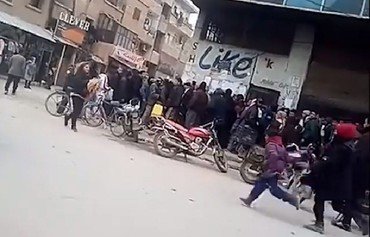Tens of thousands of Syrians in areas recaptured by regime forces this year remain starved of humanitarian aid, with the relief agencies helping them for years now unable to reach them.
As towns switched from opposition to regime control, international aid groups were forced to halt their crucial health, food and protection services as they had no government authorisation to work.
Since April this has left vulnerable civilians in Syria's south, in the Eastern Ghouta region outside Damascus and rural parts of Homs province without the vital support they once relied on.
"In total, tens of thousands of people are impacted by the halt in humanitarian aid," said Joelle Bassoul, spokeswoman for CARE International, which used to send aid into opposition-held areas.
"In effect, when we stop operating, it means our partners have stopped operating and have no more humanitarian capacity in the given area."
More than seven years into Syria's conflict, 13 million people across the country still need humanitarian assistance, according to the UN.
Aid became politicised early on, and two separate operations developed.
One, based out of Damascus, saw the UN and other agencies providing assistance solely with regime authorisation.
Meanwhile, non-governmental organisations (NGOs) based in Turkey or Jordan helped civilians in opposition-held areas through a parallel system.
This year, the regime brought many of those areas under its control through a string of military victories, forcing those international agencies to pull out.
Clinics close
"The aid that used to come from international agencies to the south completely stopped," said Mohammad al-Zoabi, 29, from Al-Mseifra in southern Syria.
"Now, there is a lack of flour, medical supplies, and hospitals in general after medical points and field clinics were closed, badly affecting people," he said.
According to the UN, 66 aid trucks entered the south from Jordan in June but zero came in July when regime forces seized the area.
Residents of south Syria reported hospital closures and a lack of medicine and flour.
They said doctors and Syrian aid workers had fled, were wanted by security forces for working in opposition areas or had requested -- but were denied -- regime permission to resume relief work.
The International Rescue Committee (IRC), Mercy Corps and Save the Children all confirmed they had halted aid programmes.
"During the course of the war, as areas have changed hands to government control, the IRC has stopped providing support in those areas," IRC country director Lorraine Bramwell said.
The IRC said it reached more than 300,000 people in Syria's south last year and backed six clinics in Eastern Ghouta.
The regime recaptured Ghouta in April after an offensive that killed 1,700 civilians.
'Constrained' access
Residents in Talbisseh, a town in Homs seized by the regime in May, said medicine and food have become unavailable or unaffordable.
"There was one functioning hospital and three medical points in Talbisseh before the regime came, but they all shut down because now they need licenses from the ministries," said Sami, 20.
Areas brought back under regime control are able to access state-provided services and receive aid from the Syrian Arab Red Crescent, the main state-approved conduit for aid.
But residents said government hospitals were often too far away, while Red Crescent aid did not match the assistance they received from international NGOs.
Others said they feared interfacing with regime services in case of retribution for years living under opposition control.
"Humanitarian access to areas that have witnessed changes in control continues to be constrained," the UN said in August.
"This prevents a timely response to humanitarian needs that for the most part remain acute following the burden of living under siege for a protracted period."
International NGOs still work in Syria's Kurdish-controlled northeast and in Idlib, the last major opposition bastion in the northwest.
And some may plan to seek regime permission to work in Damascus.
Mercy Corps has already applied, said country director Arnaud Quemin, stressing however that the breadth and scope of cross-border operations would not easily be replaced.

![Syrian boys sit in the street as a humanitarian convoy carrying food arrives in the opposition-held town of Douma in Eastern Ghouta on March 15th. As towns switched from opposition to regime control, many international aid groups have been forced to halt their services. [Hamza al-Ajweh/AFP]](/cnmi_di/images/2018/10/10/14837-Syrian-boys-Ghouta-600_384.jpg)




